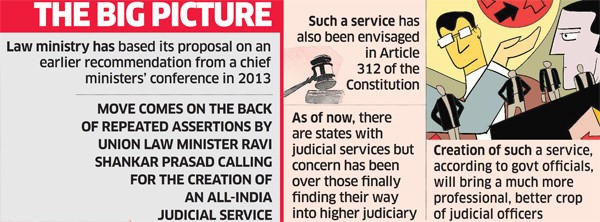Ahmedabad
(Head Office)Address : 506, 3rd EYE THREE (III), Opp. Induben Khakhrawala, Girish Cold Drink Cross Road, CG Road, Navrangpura, Ahmedabad, 380009.
Mobile : 8469231587 / 9586028957
Telephone : 079-40098991
E-mail: dics.upsc@gmail.com

All-India Judicial Services (AIJS)
News: During her inaugural address at the Supreme Court’s Constitution Day celebration o, President Droupadi Murmu called for an “all-India judicial service” to recruit judges, saying this will help make the judiciary diverse by increasing representation from marginalised social groups.
What is the AIJS?
• Article 312 of the Constitution provides for the establishment of an All-India Judicial Service (AIJS), along the lines of the central civil services.
• If the Rajya Sabha declares through a resolution, supported by at least two-thirds of its present and voting members, that it is necessary or expedient to create a service in “national interest,” the Parliament “may by law provide for the creation of one or more all India services (including an all India judicial service) common to the Union and the States” and regulate the recruitment and service conditions of persons appointed to any such service.
• However, Article 312 (2) states that the AIJS cannot include any post inferior to that of a district judge, as defined in Article 236.
How will this differ from the present system of selection?
• Articles 233 and 234 of the Constitution of India deal with the appointment of district judges and place it in the domain of the states.
• The selection process is conducted by the State Public Service Commissions and the concerned High Court,. Panels of HC judges interview candidates after the exam and select them for appointment.
• All judges of the lower judiciary up to the level of district judges are selected through the Provincial Civil Services (Judicial) exam. PCS (J) is commonly referred to as the judicial services exam.
What are the benefits of AIJS?
• Effective Subordinate Judiciary: AIJS will ensure an effective subordinate judiciary, solve structural concerns including different salary and compensation between states, fill vacancies more quickly, and guarantee uniform training throughout states.
• Addressing Judges To Population Ratio: A Law Commission report (1987) recommended that India should have 50 judges per million population as against 10.50 judges (then). AIJS envisages to bridge the underlying gap in judicial vaccines.
• Higher Representation of Marginalised Sections of Society: According to the Government, AIJS is an ideal solution for equal representation of the marginalised and deprived sections of society.
• Attracting Talent Pool: The government believes that if such a service comes up, it would help create a pool of talented people who could later become a part of the higher judiciary.
• Bottoms-Up Approach: The bottoms-up approach in the recruitment would also address issues like corruption and nepotism in the lower judiciary. It will improve the quality of justice dispensation in the lower levels of society.
• Responsibility and Transparency: A career in judicial service will make the judiciary more responsible, more transparent.
• Infuses Objectivity in Hiring: The open competition would provide objectivity in the hiring process of the judiciary.
• Securing the Best Talent: AIJS will ensure a secure and attractive career for talented young men and women.
Challenges in Implementing:
• Opposition from High Courts and States: The filling of vacancies of Judicial officers or Judges in Subordinate Courts and Districts is the domain of the respective High Courts and State Governments. They have opposed the AIJS on the grounds that it would be an infringement of their rights.
• Lack of Consensus: There is a lack of consensus among the major stakeholders, including the judiciary and the government, on the implementation of the AIJS.
• Diversity in Local Laws: India has a diverse legal system with different states having their own laws and regulations. Implementing a centralized judicial service might overlook this diversity.
• Language Barrier: Judges often need to know the local language to understand the cases better. A centralized recruitment might lead to situations where judges are not familiar with the local language.
• Administrative Challenges: The administrative challenges of setting up a new service, including training, infrastructure, and logistics, are significant.
• Constitutional Amendments: The implementation of AIJS would require amendments to the Constitution, which is a complex and time-consuming process.

Address : 506, 3rd EYE THREE (III), Opp. Induben Khakhrawala, Girish Cold Drink Cross Road, CG Road, Navrangpura, Ahmedabad, 380009.
Mobile : 8469231587 / 9586028957
Telephone : 079-40098991
E-mail: dics.upsc@gmail.com
Address: A-306, The Landmark, Urjanagar-1, Opp. Spicy Street, Kudasan – Por Road, Kudasan, Gandhinagar – 382421
Mobile : 9723832444 / 9723932444
E-mail: dics.gnagar@gmail.com
Address: 2nd Floor, 9 Shivali Society, L&T Circle, opp. Ratri Bazar, Karelibaugh, Vadodara, 390018
Mobile : 9725692037 / 9725692054
E-mail: dics.vadodara@gmail.com
Address: 403, Raj Victoria, Opp. Pal Walkway, Near Galaxy Circle, Pal, Surat-394510
Mobile : 8401031583 / 8401031587
E-mail: dics.surat@gmail.com
Address: 303,305 K 158 Complex Above Magson, Sindhubhavan Road Ahmedabad-380059
Mobile : 9974751177 / 8469231587
E-mail: dicssbr@gmail.com
Address: 57/17, 2nd Floor, Old Rajinder Nagar Market, Bada Bazaar Marg, Delhi-60
Mobile : 9104830862 / 9104830865
E-mail: dics.newdelhi@gmail.com